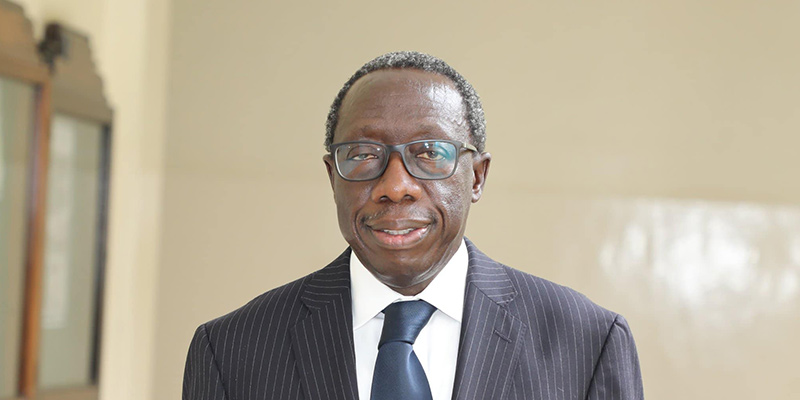Wildebeest, zebra, antelopes, and other animals invaded a wheat and barley plantation in droves, destroying 1,689 hectares of crops whose value was estimated at Sh64,160,130. Efforts to get compensation from the Kenya Wildlife Service had failed, forcing the farming company to lodge its claim in court in 2002. In 2011, the High Court awarded the farming company KSh31.5 million. The judgment is one of the sample writings Justice William Ouko has submitted to the Judicial Service Commission as part of his application for the positions of Chief Justice and Judge of the Supreme Court.
Besides his bench experience, William Okello Ouko, 60, can find his way around the Kenyan judiciary blindfolded. He started his career in the institution as a district magistrate before being appointed registrar, rising to chief court administrator before ultimately being appointed registrar of the High Court.
It is from his perch as registrar of the High Court that he administered the oath of office to the newly elected president, Mwai Kibaki, at Uhuru Park in Nairobi on 30 December 2002.
In his 33 years of legal practice, Ouko has served as joint secretary of the Goldenberg Commission of Inquiry, where he is remembered for his deadly efficiency which has over time earned him the highest service honours in the country – Elder of the Burning Spear and Chief of the Burning Spear. But his imprimatur on the institution is the report of the task force on judiciary reforms he co-chaired with Nyamira Senator Okong’o Omogeni, which bears his name.
Many of the recommendations in the Ouko report were included in the 2010 Constitution, such as expanding representation in the Judicial Service Commission to include the Supreme Court, the Law Society of Kenya and the Kenya Judges and Magistrates Association, and laying down procedures for the removal and discipline of judges. It also proposed the introduction of performance management in the judiciary, alongside a ring-fenced financial allocation of at least 2.5 per cent of the annual national budget.
The report is the most comprehensive blueprint for change in the judiciary. The Judiciary Transformation Framework launched by Chief Justice Willy Mutunga acknowledges the foundational work of the Ouko Report in reforming the institution.
There is no court in Kenya Justice Ouko does not personally know, and his knowledge is a product of experience and study. As High Court judge, he served in Malindi, Meru and Nakuru between 2004 and 2012.
Ouko was appointed to the Court of Appeal in 2013, and has sat on many benches with colleagues. Since his election as President of the Court of Appeal, Justice Ouko has shown some of his reputation for efficiency by listing all applications for priority hearing so that the court can spend more time on real appeals. He has decried the low staffing numbers in the Court of Appeal – which is operating at half capacity because of the stalemate over the appointment of 11 new judges for the court – and dramatically closed down the stations in Malindi, Kisumu and Nyeri in response to the personnel shortage.
As recently as 2016, while writing his thesis for his master of arts in criminology and criminal justice at Egerton University, Justice Ouko found that in Nairobi, magistrates’ decisions were respected and obeyed, but officers showed signs of stress and were perceived as lacking integrity.
Ouko established that court jargon impeded access to justice even when interpretation was provided because the numbers of interpreters were insufficient, and in some instances their interpretation was inaccurate. His study recognised that many people preferred to resolve their disputes outside the courts and proposed more legal aid and pro bono services to increase access to justice.
Within the institution, Justice Ouko is respected for his work in improving the conditions of service and institutionalising retirement benefits for judicial officers. He is a custodian of many judicial traditions and customs because of his massive institutional memory. He is also knowledgeable and confident enough to eyeball the leadership of the Executive and Parliament, as he has done on questions of retirement benefits and in explaining the logic of judicial independence, but some anxieties animate his candidacy.
Ouko’s relatively youthful age presents the possibility that he could be Chief Justice for a decade, which could cast the institution in a mould from which it could take time to be freed. At 60, Justice Ouko is 10 years away from retirement, and therefore has a chance to preside over two presidential electoral cycles. That possibility raises questions about perceptions of where his loyalties might lie in the context of Kenya’s highly ethnicised politics.
Although Justice Ouko, born in Siaya, is regarded as a distant relation of opposition leader and four-time presidential candidate Raila Odinga, some perceive him as not being a ‘good Luo’ for not visibly playing ally in ethnic politics. His political neutrality is considered a great liability within political circles close to Odinga, whose view is that Justice Ouko’s ascendancy to the Chief Justice’s position would be premature payback for the political détente between Odinga and President Uhuru Kenyatta that could lay the basis for shortchanging the former on a political leadership deal. They argue that appointing Justice Ouko to the head of the Judiciary would imply that President Kenyatta had been released from any perceived obligation to provide political support to Odinga in the 2022 election. If the whisper gains currency, it could drive Justice Ouko’s candidacy for Chief Justice into a political storm from which it might be difficult to recover. His shared ethnicity with former Supreme Court judge Jackton Boma Ojwang, who retired last year, is also being considered as a means to put his ambitions on ice by parking him in the apex court with the promise of ascending to the top job in a few years’ time.
–
Back to: Kenya Chooses Its Next Chief Justice








